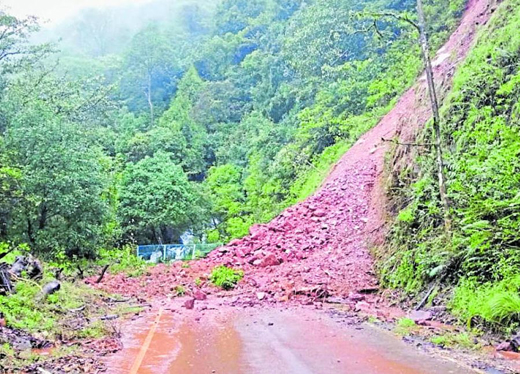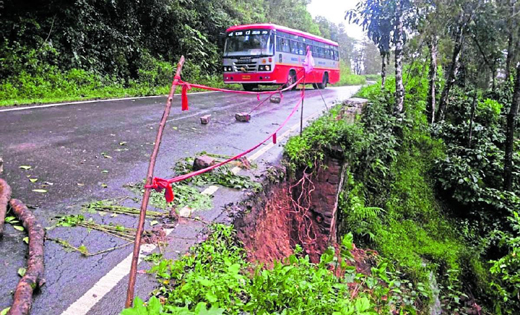
Minister Deshpande for expert panel to study landslides in region
Mangalore Today News Network
Mangaluru, Aug 20, 2018: Speaking to media while visiting the landslide affected areas in Jodupala on the border of DK-Kodagu districts on August 19, Sunday, Revenue Minister R V Deshpande said that expert committee will be constituted to study the triggers behind the massive landslides, which are being reported from Kodagu and Dakshina Kannada districts,


The minister said, “The reason for the landslide is not known. Hence, I will appeal to the Chief Minister to constitute an expert committee to study the landslips.”
The priority before the state government is to rescue the stranded people from the landslide and flood-affected areas and providing rehabilitation to them. All the relief centres have been inspected. The centres do not lack any basic facilities. The victims have been asked not to leave for their houses as the landslides continue to occur in Kodagu, he said.
The officials have been directed to identify schoolchildren who are provided shelter at Sampaje and Kallugundi relief centres. The DK district administration has been directed to provide them with temporary admission to the nearby schools.
To a query, the minister said that strict action will be initiated against those who raise funds in the name of flood relief without permission from the district administration.
He said that 1,326 pucca houses have been damaged in Dakshina Kannada in the recent rain. Of which 280 houses have completely collapsed. A compensation of Rs 1.47 crore has been distributed among the affected families.
A total of 434 kutcha houses have been damaged, of which, 386 houses have been fully damaged. Compensation has been paid to the families of 11 people who lost their lives in the rain-related incidents.
In Udupi, 40 houses have been fully damaged and 1,017 houses have been partially damaged. Crops on 29 hectares of land have been destroyed in the rain. The state government will release Rs 4 crore under the calamity relief fund to Udupi on Monday.
Karnataka ignored expert reports :
Karnataka (as wll as Kerala) have followed the steps of Uttarakhand, assert noted ecologist Madhav Gadgil and well-known scientist Krishnaswamy Kasturirangan.
The two, in their separate reports on the fragile Western Ghats, had pressed for the formation of eco-sensitive zones to ensure that a buffer is maintained and there are no calamities. They had stressed on planned development, especially on the hilly terrains. But politicians of the two states, besides the central government, put the reports on the backburner.
The two experts stated, “This is a man-made disaster. Instead of indulging in corrupt practices and clearing unscientific proposals, the land-use pattern should have been documented. The government did not learn lessons from other states.”
Repeat of Uttarakhand : “Due to pressure from various quarters the reports were put on the freezer. The rain is historical and unprecedented. Development should not just be real estate. Development has many aspects - clean water, clean air and health. This is being ignored not just here (Karnataka and Kerala) and Uttarakhand, but all over the country,” Gadgil said.
Kasturirangan said very good laws exist, but are not implemented. The ministry of environment and forests had set up an expert panel in 2010 and entrusted Gadgil with the task of finding ways of conserving the Western Ghats. Gadgil’s ‘Western Ghats Ecology Expert Panel report’ in 2011 was not implemented by the governments. The report of Kasturirangan’s ‘High-Level Working Group on Western Ghats,’ in 2013, was also not implemented. The two had documented the land use and recommended the formation of eco- sensitive zones (ESZs). However, the zones defined in the two reports were different. The two reports had recommended that restrictions be imposed on mining, quarrying, thermal and hydel power plants in the ESZs. They had also cautioned against heightened tourist activities. They had pointed out rampant encroachment of forests, buffer zones, wetlands, streams and rivers